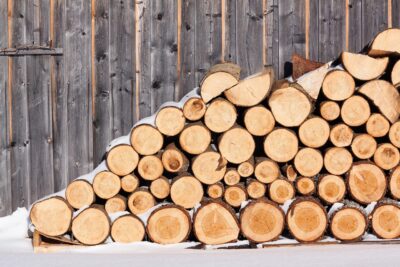Marcus Hook, Pennsylvania–Hardwood lumber distributor Alan McIlvain Company, headquartered here, has been offering custom-width sorted hardwood lumber since 1798. Product offerings from Alan McIlvain Company include: custom-width sorted rough lumber, custom and standard mouldings, S4S with priming, sanding, and kiln-drying available.
With arguably one of the most diverse and largest inventories of any hardwood supplier on the East Coast, Alan McIlvain Company purchases approximately 12 million board feet combined annually in hardwoods, softwoods and imported species.
Stocking primarily FAS grade or Better hardwoods based on National Hardwood Lumber Association (NHLA) grading rules, species available include Red and White Oak, Ash, Basswood, Birch, Walnut, Hard and Soft Maple, Poplar, Hickory, Cypress, Cherry, Alaskan Yellow Cedar, White Pine, Sapele, Spanish Cedar, African Mahogany, Jatoba, Teak, Ipe, and Santos Mahogany (4/4-16/4 FAS & Better).
In the last three years, Alan McIlvain Company has upgraded all of its operational equipment to streamline processes and obtain efficiency gains. With state-of-the-art dry kilns and some of the most experienced operators in the industry producing consistently dried, tension-free lumber, President Lan McIlvain said the company’s automated sorting equipment allows them to produce a wide variety of width, length and grade combinations. “Our process is unified so that a customer can order the exact lumber he needs to complete his projects with minimal waste,” he explained. “We’ve recently updated our equipment with new Weinig moulders and a new priming line that not everybody knows we have. We installed a new Weinig ripsaw and Weinig grinders.” Vice President Jordan McIlvain added, “All of the new moulders have HSK heads on them.”

The company also has six American Wood Dryer kilns with 60,000 board foot capacity each as well as a 30-bin automated stacking/sorting system.
Jordan McIlvain described the process at Alan McIlvain Company. “We receive the lumber and put it on sticks and air-dry it for the appropriate amount of time depending on the species and thickness. After we dry it, we bring it right back in and take it off the sticks and sort it by widths and lengths so that it’s presorted. After the sort it’s run into inventory. Everything is run to order; we don’t pre-run mouldings. Everything is run to the specifications of the customer’s request.”
Lan McIlvain added, “We inventory all FAS lumber in several different species and then we sell about 50 percent of it as rough and surfaced lumber. The other 50 percent goes into our moulding and millwork operation. We have a priming line and offer painted mouldings, also. Our millwork is all custom and run-to-order for customer specs.”
With many of their lumber and lumber products in special applications, Lan McIlvain said diversity and quality set Alan McIlvain apart. The company’s 7th generation status provides the evidence that the operation not only provides quality products, but has the wherewithal to withstand challenges. “As one of the premier hardwood lumber suppliers in the mid-Atlantic region, we provide quality hardwoods for an infinite variety of applications,” Jordan McIlvain said. “We’re committed to providing exceptional customer service. Every department contains friendly, knowledgeable staff to assist in every stage of the lumber and moulding process—from supplying quotes based on customer requests to delivering every order as quickly as possible.”
“We offer consistency in all species of hardwood lumber,” Lan McIlvain added. “When the market changes, we’re flexible. We’ve grown the company to a point where we focus on customizing our products to our customers’ specifications.”
Focusing on the midsize customers from two to three person shops to larger, commercial customers, the strong roots of the Alan McIlvain Company, located 10 miles south of Philadelphia, have proven sturdy over the 224-year span that the firm has been in business.
When Hugh McIlvain, a Quaker of Scotch-Irish descent, opened the doors of his lumber company in 1798, in Philadelphia, he planted seeds that would continue to grow for generations to come.
In the late 1700’s, the company used rivers and canals to transport lumber from sawmills to their lumberyard. The early McIlvain customers were carpenters, furniture makers and industrialists.
By selling lumber to home construction companies, the company overcame one of its first obstacles: The Embargo Act of 1807, which stopped all shipments to and from American ports.
By 1834, the first rail/canal connection was completed from Philadelphia to Pittsburgh, which conveniently ended right at the McIlvain’s door, presently the location of Philadelphia’s 30th St. Station. This marked the beginning of the railroad era, bringing about numerous opportunities for the McIlvains.
During the Civil War, lumber was used in factories to construct arms and war-related items. By 1868, the third generation of McIlvains was running the family business and their contagious popularity continued to spread, due to the quality service they provided. In 1872, the University of Pennsylvania called upon the McIlvain Lumber Company for materials needed to build its new campus in West Philadelphia.
When the company approached its 100-year anniversary, a Centennial celebration was held. The New York Lumber Trade Journal said, “This is the only instance of the kind in the United States of a lumber concern 100 years old at least by succession in direct line… what the family does not know about lumber is certainly not worth studying. Some lumbermen come and go, but McIlvain’s go on forever.”
In 1906, the McIlvains had yet another obstacle to hurdle, when the Philadelphia lumberyard was destroyed by fire. About 12 million board feet of lumber and sheds went up in flames, letting off a glow that could be seen as far as 60 miles away in Atlantic City, New Jersey.
The company remained strong after the fire and was able to continue doing business because of a delivery that carried 138 carloads of lumber, which was already in route before the fire broke out.
During both World War I and World War II, the McIlvains used their established reputation to again provide lumber to shipyards.
Shifting gears in 1946, the company closed its retail store and began selling only to industrial clients.
Today, the Alan McIlvain Company has 90 employees with Alan Mcllvain III, Jordan McIlvain and Weld McIlvain of the 7th generation running the business.
Passing the tests of endurance and trial, McIlvain ancestors have succeeded in the lumber industry. Seven generations have proven their strength and reliability in providing lumber and millwork all over the world.
Alan McIlvain Company is a member of the National Hardwood Lumber Association (NHLA); International Wood Products Association (IWPA); Hardwood Manufacturers Association (HMA); Penn-York Lumbermen’s Club; and Keystone Kiln-Dried Association. Jordan McIlvain is a board member of the NHLA and the Hardwood Federation, the Treasurer of the IWPA, and the past president of the Penn-York Lumbermen’s Club.
For more information visit www.alanmcilvain.com.









